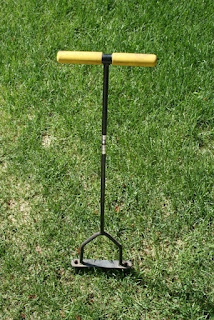This
is the time of year when your geraniums and petunias can suddenly stop blooming.
When you look closely, you’ll see what looks like black pepper on the leaves
and you’ll see tiny holes in the geranium flower buds.
The problem is a tiny
worm, called a budworm. You can help control budworm with biological
insecticides containing BTi, such as Dipel and Thuricide.
These products will
control all kinds of worms and caterpillars, including tomato horn worm. It
takes care of the worm problem and won’t hurt your crops. If you choose, you
can hand pick tomato horn worm. When you see the leaves start to disappear off
your tomato plants, start looking for a large green worm. Once you spot them, it’s
easy to pick them off by hand.
Early June is a good time to repair bad spots in
your lawn. Rake up the area you want to reseed or sod. Spread some compost or
peat moss over the area you’re patching. Apply your grass seed evenly, then
cover the seed about 1/4" deep with compost or peat moss. Water thoroughly
and keep the area moist until the seed germinates.
This is a handy tool to
have. You can use it to hand aerate chronic trouble spots in your lawn. Aeration
helps break up the soil and gets air down to the roots.
Applying Revive™ now
will help your lawn use water more efficiently and stay greener during the
upcoming summer months.
If you have dandelions and other weeds in your lawn, now’s
the time to apply Fertilome’s Weed-Out Plus. This will feed your lawn and get rid of broadleaf
weeds, including dandelions.
This is the time to start fertilizing your flowering
annuals with Fertilome water soluble 20-20-20. You should feed container
plants, including hanging baskets every 7-10 days. Annuals planted in the
ground can go a little longer between feedings. Plan to feed these plants every
14 days. Some other things to watch out for this time of year. You might see
grass starting to grow amongst your iris and phlox. You can use Grass B Gon ready-to-use to get rid of the grass without harming
your perennials.
Start checking your roses and other ornamental plants for powdery mildew starts to show up.
Powdery mildew looks like white, talcum powder on your
roses, lilacs, phlox, etc. Powdery mildew can also affect vegetables.
Prune your plants to improve air circulation; avoid
watering overhead especially late in the day and spray the affected plants with
sulfur. For help with your unique lawn or garden question, stop by our
Diagnostic Center. We’ll find the right solution for you.










A beautiful, fresh lawn, like the one displayed below, is often the starting p best 22 inch self propelled lawn mower
ReplyDeleteoint for an attractive garden:
A soil test requires the homeowner to send samples to a professional lab. When an imbalance is found after testing the samples, the homeowner must fertilize-but fertilize with the correct chemicals and the correct amount of chemeicals. An overuse of chemical pesticides or fertilizers is a tremendous matter of environmental concern. Overuse will result in the excess chemicals being washed off during the rain, which will enter into the groundwater or water system of the community. water sprinkler
ReplyDelete